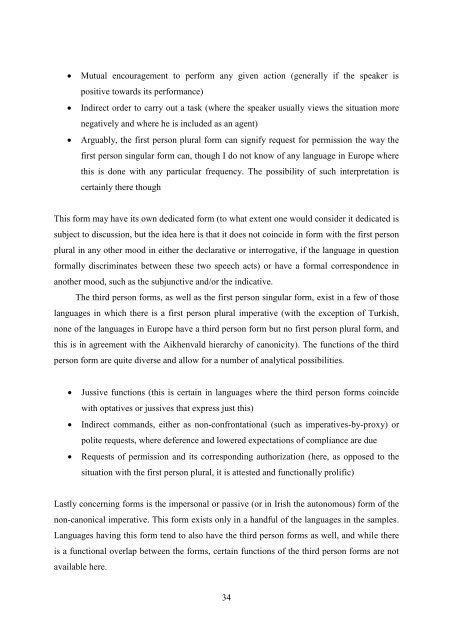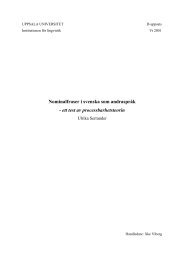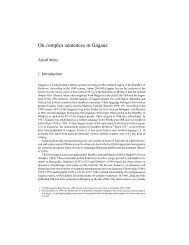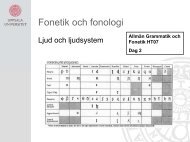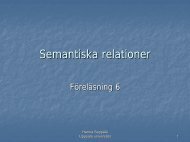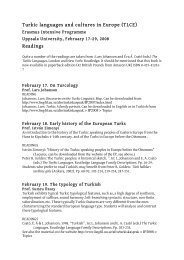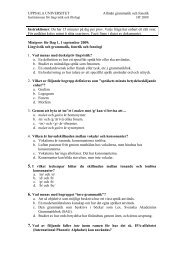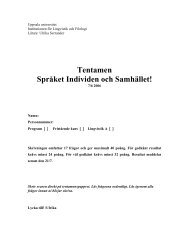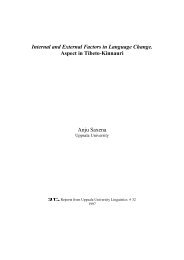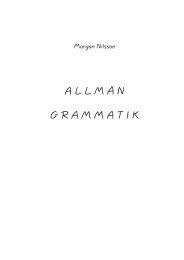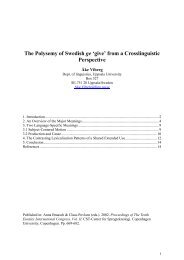The function of non-canonical imperatives in the languages of Europe
The function of non-canonical imperatives in the languages of Europe
The function of non-canonical imperatives in the languages of Europe
You also want an ePaper? Increase the reach of your titles
YUMPU automatically turns print PDFs into web optimized ePapers that Google loves.
Mutual encouragement to perform any given action (generally if <strong>the</strong> speaker is<br />
positive towards its performance)<br />
Indirect order to carry out a task (where <strong>the</strong> speaker usually views <strong>the</strong> situation more<br />
negatively and where he is <strong>in</strong>cluded as an agent)<br />
Arguably, <strong>the</strong> first person plural form can signify request for permission <strong>the</strong> way <strong>the</strong><br />
first person s<strong>in</strong>gular form can, though I do not know <strong>of</strong> any language <strong>in</strong> <strong>Europe</strong> where<br />
this is done with any particular frequency. <strong>The</strong> possibility <strong>of</strong> such <strong>in</strong>terpretation is<br />
certa<strong>in</strong>ly <strong>the</strong>re though<br />
This form may have its own dedicated form (to what extent one would consider it dedicated is<br />
subject to discussion, but <strong>the</strong> idea here is that it does not co<strong>in</strong>cide <strong>in</strong> form with <strong>the</strong> first person<br />
plural <strong>in</strong> any o<strong>the</strong>r mood <strong>in</strong> ei<strong>the</strong>r <strong>the</strong> declarative or <strong>in</strong>terrogative, if <strong>the</strong> language <strong>in</strong> question<br />
formally discrim<strong>in</strong>ates between <strong>the</strong>se two speech acts) or have a formal correspondence <strong>in</strong><br />
ano<strong>the</strong>r mood, such as <strong>the</strong> subjunctive and/or <strong>the</strong> <strong>in</strong>dicative.<br />
<strong>The</strong> third person forms, as well as <strong>the</strong> first person s<strong>in</strong>gular form, exist <strong>in</strong> a few <strong>of</strong> those<br />
<strong>languages</strong> <strong>in</strong> which <strong>the</strong>re is a first person plural imperative (with <strong>the</strong> exception <strong>of</strong> Turkish,<br />
<strong>non</strong>e <strong>of</strong> <strong>the</strong> <strong>languages</strong> <strong>in</strong> <strong>Europe</strong> have a third person form but no first person plural form, and<br />
this is <strong>in</strong> agreement with <strong>the</strong> Aikhenvald hierarchy <strong>of</strong> ca<strong>non</strong>icity). <strong>The</strong> <strong>function</strong>s <strong>of</strong> <strong>the</strong> third<br />
person form are quite diverse and allow for a number <strong>of</strong> analytical possibilities.<br />
<br />
<br />
<br />
Jussive <strong>function</strong>s (this is certa<strong>in</strong> <strong>in</strong> <strong>languages</strong> where <strong>the</strong> third person forms co<strong>in</strong>cide<br />
with optatives or jussives that express just this)<br />
Indirect commands, ei<strong>the</strong>r as <strong>non</strong>-confrontational (such as <strong>imperatives</strong>-by-proxy) or<br />
polite requests, where deference and lowered expectations <strong>of</strong> compliance are due<br />
Requests <strong>of</strong> permission and its correspond<strong>in</strong>g authorization (here, as opposed to <strong>the</strong><br />
situation with <strong>the</strong> first person plural, it is attested and <strong>function</strong>ally prolific)<br />
Lastly concern<strong>in</strong>g forms is <strong>the</strong> impersonal or passive (or <strong>in</strong> Irish <strong>the</strong> autonomous) form <strong>of</strong> <strong>the</strong><br />
<strong>non</strong>-ca<strong>non</strong>ical imperative. This form exists only <strong>in</strong> a handful <strong>of</strong> <strong>the</strong> <strong>languages</strong> <strong>in</strong> <strong>the</strong> samples.<br />
Languages hav<strong>in</strong>g this form tend to also have <strong>the</strong> third person forms as well, and while <strong>the</strong>re<br />
is a <strong>function</strong>al overlap between <strong>the</strong> forms, certa<strong>in</strong> <strong>function</strong>s <strong>of</strong> <strong>the</strong> third person forms are not<br />
available here.<br />
34


